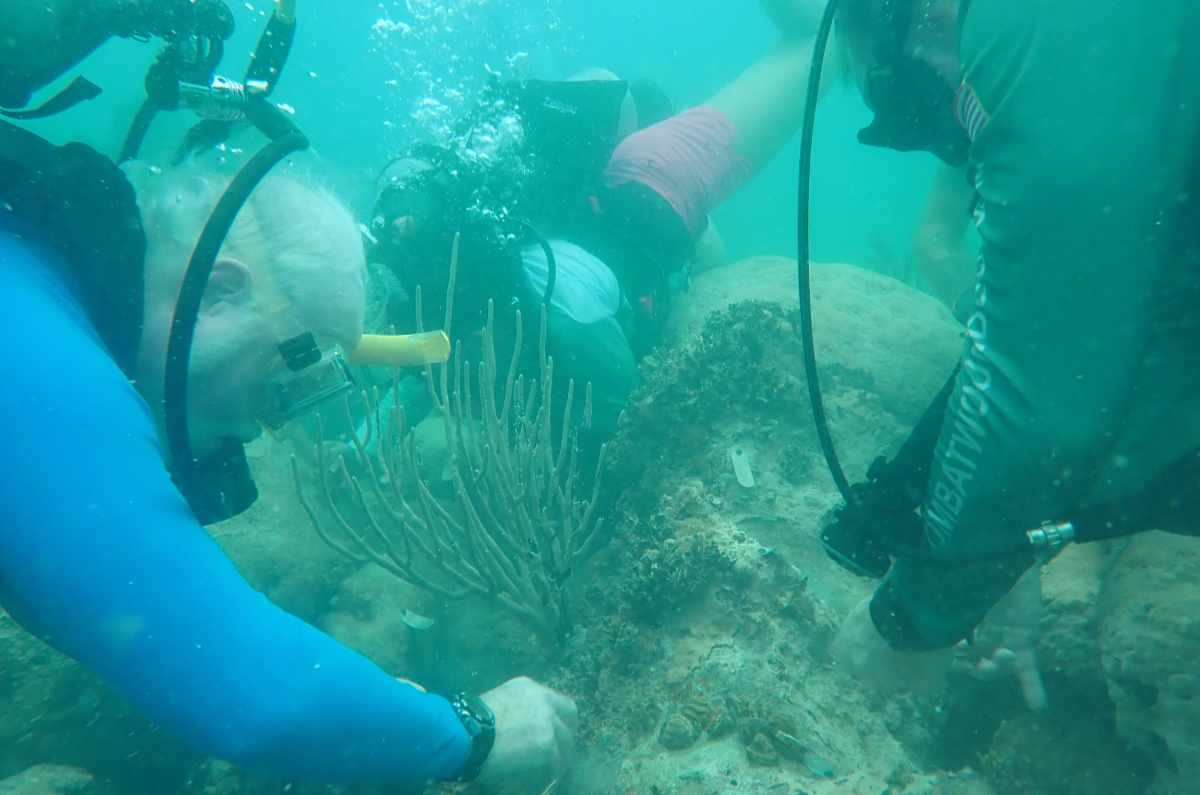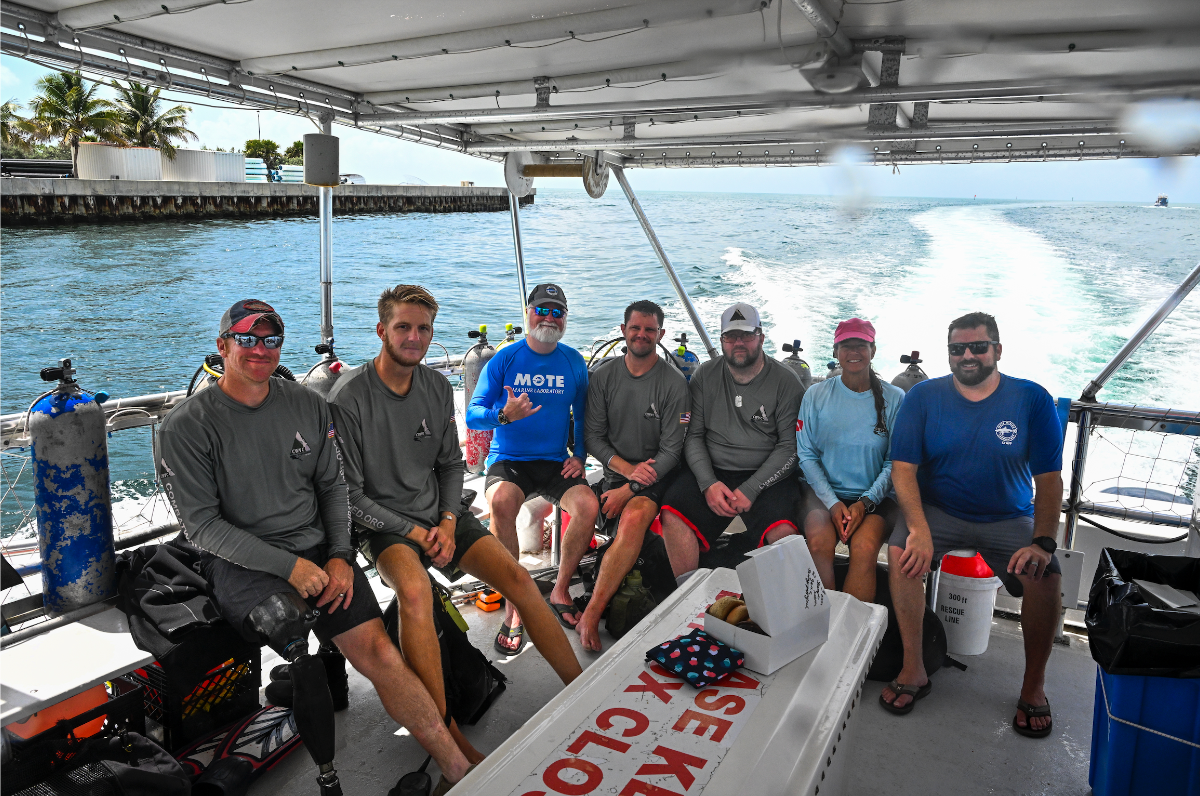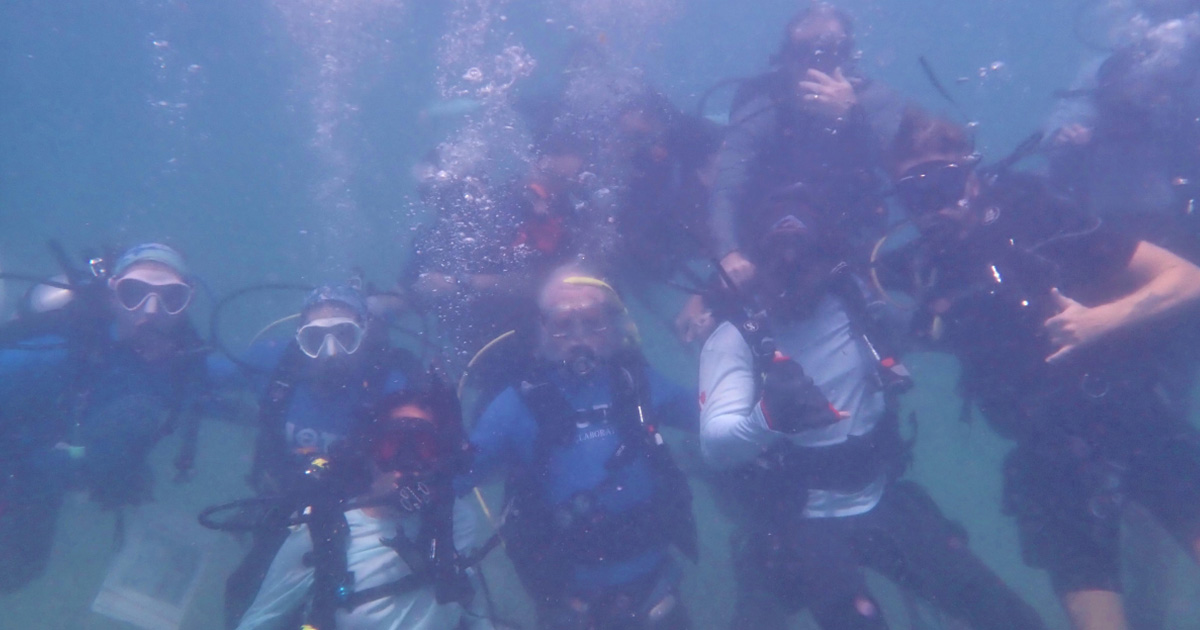On Thursday, July 13, Mote Marine Laboratory once again joined forces with members of the Combat Wounded Veteran Challenge (CWVC) to plant corals and restore the Higgs Head coral reef in Key West.
This event marks the eleventh year of a unique coral restoration partnership that enables combat wounded veterans the opportunity to participate in cutting-edge, science-based marine habitat restoration.
Combat wounded and injured veterans with various types of injuries including traumatic brain injury, transtibial (below the knee), transfemoral (above the knee) amputees, as well as many other less noticeable combat related injuries participated in this summer’s planting. Many of the CWVC participants who had lost limbs were able to dive utilizing specialized waterproof prosthetics, some of which have been developed from research conducted during prior year’s Mote-CWVC missions.
During the single tank dive mission at Higgs Head reef, the group of 31 CWVC divers and six Mote staff including President & CEO Dr. Michael P. Crosby, planted a CWVC record-breaking 1040 corals on the reef, bringing the total number of corals planted by Mote to nearly 220,000.
 Mote President and CEO, Dr. Michael Crosby, and combat wounded veterans work together to restore the Higgs Head coral reef in Key West using Mote's science-based methods. (Image credit: Mote)
Mote President and CEO, Dr. Michael Crosby, and combat wounded veterans work together to restore the Higgs Head coral reef in Key West using Mote's science-based methods. (Image credit: Mote)
“The inspirational CWVC motto Vulneror non Vincor (I am wounded, not conquered) is also applicable to Keys corals reefs,” said Dr. Michael P. Crosby, Mote President & CEO, “Which, like reefs around the world, have declined for the last 40 years, but benefit from science-based and community-engaged conservation and restoration efforts. Today, the Mote-CWVC partnership built upon impactful work we’ve been doing together since 2012, and today, thanks to the support of the City of Key West, we were able to plant over 1,000 coral fragments at Higgs Head, which is a new reef location for this initiative. We are so pleased that with this support we were together able to extend Mote’s science-based and community engagement restoration efforts to the beautiful reefs off Key West.”
Mote has been studying coral ecosystems for decades and is an international leader in the development of innovative coral reef restoration technologies, including a recent breakthrough in identifying natural coral genotypes that are resilient to increased ocean temperature, acidification, and diseases. Utilizing resilient coral genotypes in a coral microfragmentation and reskinning methodology, Mote science is now the basis for multiple organizations to engage in growing threatened and reef building coral species for replanting on decimated or damaged sections of reefs throughout the Florida Keys in order to reverse decades of dramatic coral population decline.
Global, regional, and local stressors have significantly contributed to the decline of our coral reef ecosystems, most notably in Florida and the Wider Caribbean Region. Living coral cover (the proportion of the reef covered in living coral) on Florida’s Coral Reef is currently between 1 and 5 percent, dramatically less than just 40 years ago when it was more than 30%. Many factors make a natural recovery of Florida’s Coral Reef unlikely and nearly impossible on a timescale relevant to humans. The recovery of function on Florida’s Coral Reef is likely now entirely dependent upon pro-active science-based restoration utilizing Mote’s paradigm changing methods.
A global focal point for such effort is Mote’s Elizabeth Moore International Center for Coral Reef Research and Restoration (IC2R3) on Summerland Key, in the Florida Keys. This state-of-the-art technology and category 5 hurricane-resistant lab was built entirely with philanthropic support and opened in 2017 as the first LEED-certified green building in Monroe County. Mote’s land-based coral fragmentation and nursery facilities are also located at Bud n’ Mary’s Marina in Islamorada, and the ReefHouse Resort and Marina in Key Largo, with several offshore underwater nurseries stretching from Key West to Key Largo.
 Mote President and CEO, Dr. Michael Crosby, Mote Coral Restoration Program Manager, Dr. Jason Spadaro, and members of the Combat Wounded Veterans Challenge before the mission to restore Florida’s coral reef on Thursday, July 13, 2023. (Image credit: Mote)
Mote President and CEO, Dr. Michael Crosby, Mote Coral Restoration Program Manager, Dr. Jason Spadaro, and members of the Combat Wounded Veterans Challenge before the mission to restore Florida’s coral reef on Thursday, July 13, 2023. (Image credit: Mote)
Thursday’s diving success, however, is measured not only in the new corals planted on the reef to help replace what has been lost through coral disease, hurricanes and most recently, raising water temperatures, but also through the inspiration of watching the rapport among wounded veterans and scientists all working together in a new mission to restore coral reefs – the rainforests of the sea.
“The coral planting gives the wounded, ill, or injured service member a new found sense of purpose, they get to help the environment and work as a team with other military members who have been what they have been through. The challenge, camaraderie, and knowing they are making a difference is the highlight of the year for almost all our participants,” said Lt. Col. (Ret) Andrew Lourake, CWVC Vice President of Operations.
The corals planted at Higgs Head are part of a coral restoration initiative with significant support from the City of Key West, and the collaboration between Mote and CWVC that is supported by the Colonel Richard D. Crosby, Jr. Memorial Veterans Fund at Mote Marine Laboratory with funding commitments in 2023 by:
- Mrs. Ann McFarland Crosby
- Dr. Michael and Mrs. Sharon Crosby
- The Resort at Longboat Key Club
- James Moran
- Several anonymous donors
All coral restoration work was conducted under Florida Keys National Marine Sanctuary (FKNMS) permit #2015-163-A1 and Florida Fish and Wildlife Conservation Commission (FWC) Special Activity License #SAL-17-1724C-SCRP.



